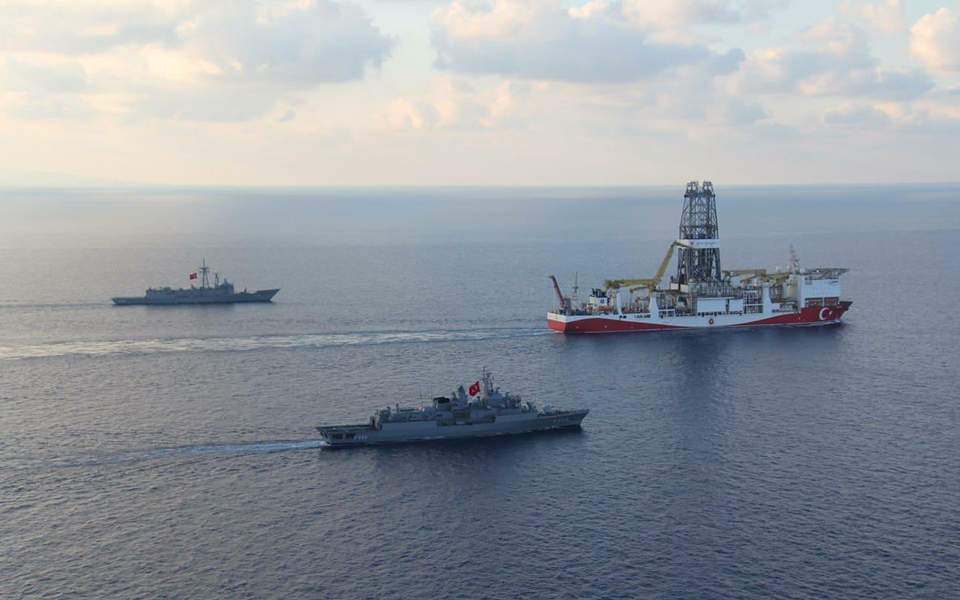The Turkey-Libya pact and the Greek islands

Turkey’s decision to sign a memorandum of understanding on maritime boundaries in the Eastern Mediterranean Sea with Libya is the latest in a long chain of provocations that have put Greece in the difficult position of trying to defend the obvious.
In addition to this recent move, there’s the map posted online by Turkish diplomat Cagatay Erciyes – which naturally had the full backing of the country’s political leadership – that depicts the boundaries of the Turkish continental shelf stretching to the midpoint of the Eastern Mediterranean, which would suggest that neither Greece nor Cyprus are entitled to a corresponding share of this sea zone. And this is despite the fact that Greece has islands in the region, while Cyprus, being an island state, has greater influence over continental shelf delimitation.
Turkey’s moves are in blatant violation of international law. According to Article 121 of the United Nations Convention on the Law of the Sea, all islands – with the exception of certain uninhabited rock formations – are entitled to a territorial sea, a contiguous zone, an exclusive economic zone (EEZ) and a continental shelf.
The convention is binding for all states, including those which are party to it and those which are not. The former are bound by having ratified and acceded to the treaty. The latter – meaning third parties that have not ratified it – are bound by customary law, which either pre-existed, or was motivated by the widespread participation of states in the treaty.
Hence the issue is not whether Turkey is bound by Article 121 (despite its persistent refusal to ratify the convention), but whether islands have a continental shelf and exclusive economic zone. On this point, international case law has made Article 121 more specific, by making certain adaptations to the general rule.
Indeed, based on certain criteria (island size, location of delimitation), the case law recognizes the continental shelf/EEZ of the islands with full or half effect. The question is to what extent can an island be treated on the same footing as the mainland and be given full effect.
The International Court offers a range of solutions which depend on the aforementioned criteria. For example, on the continental shelf dispute Tunisia vs Libyan Arab Jamahiriya, the court concluded that the Kerkennah Islands off the coast of Tunisia should not be given full effect in determining the direction of the coast. In the Libya vs Malta continental shelf case, the court drew a delimitation line north of the median line, attributing a greater area of continental shelf to Libya due to the marked disparity in coastal lengths.
What would the court rule in the case of the Greek islands whose eastern coastlines face the Eastern Mediterranean? I believe that the coasts of Rhodes, Karpathos, Kasos and Crete justify a projection into the Eastern Mediterranean that forms Greece’s continental shelf and EEZ. These are not very small islands with limited shorelines and in close proximity to the mainland, which would justify their exclusion from continental shelf delineation. As a consequence, they enjoy all the rights deriving from Article 121 of the convention. I would not go so far as to make a claim in favor of full effect because that also depends on Turkey’s corresponding coastline. But this is of little importance given that Turkey, by signing the Libya memorandum and releasing the aforementioned map, leaves no room for Greece to claim a continental shelf/EEZ, instead restricting it to a narrow 6-nautical mile sea zone.
Faced with this extreme behavior, what sort of weapons does Greece have in its arsenal? As has often been emphasized, the country’s ultimate and undisputed weapon would be to resort to international justice. It would be useful, before resorting to this, to attempt to restart exploratory talks with the aim of achieving, to the extent that this is possible, certain positive results and ease Turkey’s concerns regarding the necessity of resorting to the International Court. Subsequently, we must launch bilateral talks on an arbitration agreement by jointly submitting a lawsuit.
What certainly cannot go on is the current cold war situation, for it begets the risk of an unpredictable escalation, a “hot incident” whose flames are not going to be doused, as was the case in the past, by allied forces.
Christos Rozakis is emeritus professor of the National and Kapodistrian University of Athens.





